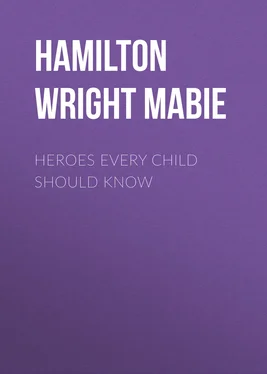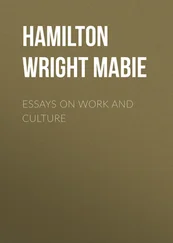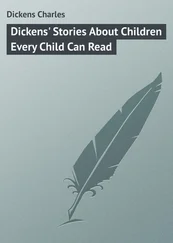Hamilton Wright Mabie - Heroes Every Child Should Know
Здесь есть возможность читать онлайн «Hamilton Wright Mabie - Heroes Every Child Should Know» — ознакомительный отрывок электронной книги совершенно бесплатно, а после прочтения отрывка купить полную версию. В некоторых случаях можно слушать аудио, скачать через торрент в формате fb2 и присутствует краткое содержание. Жанр: foreign_children, foreign_antique, foreign_prose, на английском языке. Описание произведения, (предисловие) а так же отзывы посетителей доступны на портале библиотеки ЛибКат.
- Название:Heroes Every Child Should Know
- Автор:
- Жанр:
- Год:неизвестен
- ISBN:нет данных
- Рейтинг книги:5 / 5. Голосов: 1
-
Избранное:Добавить в избранное
- Отзывы:
-
Ваша оценка:
- 100
- 1
- 2
- 3
- 4
- 5
Heroes Every Child Should Know: краткое содержание, описание и аннотация
Предлагаем к чтению аннотацию, описание, краткое содержание или предисловие (зависит от того, что написал сам автор книги «Heroes Every Child Should Know»). Если вы не нашли необходимую информацию о книге — напишите в комментариях, мы постараемся отыскать её.
Heroes Every Child Should Know — читать онлайн ознакомительный отрывок
Ниже представлен текст книги, разбитый по страницам. Система сохранения места последней прочитанной страницы, позволяет с удобством читать онлайн бесплатно книгу «Heroes Every Child Should Know», без необходимости каждый раз заново искать на чём Вы остановились. Поставьте закладку, и сможете в любой момент перейти на страницу, на которой закончили чтение.
Интервал:
Закладка:
A hind was there of such loveliness and grace that Artemis had marked her for her own, and given her a pair of golden horns so that she might be known from all other deer and her life thus preserved. For no good Hellen, or Greek, would slay for food any animal sacred to a god. This beautiful golden-horned hind Eurystheus ordered Hercules to bring to him alive, for the irreverence of the King did not go so far as to demand her dead.
So Hercules went forth for the hunting and, not wishing to wound the hind, pursued her for one entire year. Up hill he went, down many a mountain dale, across many a gleaming river, through deep forest and open field, and always dancing before him were the golden tips of horns of the hind—near enough to be seen, too far to be seized. At last tired with the pursuit the lovely beast one day took refuge upon a mountain side, and there as she sought the water of a river, Hercules struck her with an arrow. The wound was slight, but it helped the hero to catch the creature, and to lift her to his shoulders. Thereupon, he started for the court of Eurystheus.
But the way was long, and it lay through a part of Arcadia where the bush was heavy, and forests were deep, and mountains were high, and while Hercules was pursuing his way and bearing his meek-eyed burden, he one day met the fair goddess to whom the hind was sacred. Her brother, the beautiful god Apollo, was with her.
Artemis seeing her captured deer cried to the hero, "Mortal, oho! thus wilt thou violate a creature set aside by the gods?" "Mighty Artemis and huntress," answered Hercules, "this hind I know is thine. A twelve-month have I chased and at last caught her. But the god Necessity forced me! Oh, immortal one, I am not impious. Eurystheus commanded me to catch the hind and the priestess of Apollo enjoined me to observe the King's command."
When Artemis understood how Hercules was bond-man she dismissed her anger, and sent him forward with kind words, and thus he brought the golden-horned hind to Mycenae and sent it in to the King.
In the northwestern part of the famed Arcadia where the golden- horned hind roamed was a range of mountains called Erymanthus. Over the high tops of this range wandered also a wild beast, but unlike the lovely hind he was fierce and terrible of aspect and deadly in encounter. He was known as the boar of Erymanthus. This tusked and terrible being the King of Mycenae, Eurystheus, commanded the mighty Hercules, his bondman, to bring alive to him.
Again Hercules set out, and again he fared over hill and across bright waters, and as he went the birds sang spring songs to him from vine and tree shade, and yellow crocuses carpeted the earth. In his journey he came one day to the home of Pholus, a centaur, who dwelt with other centaurs upon the side of a mountain. Now the centaurs were, of all the dwellers of that distant land, most unlike us modern folks. For report has it that they were half that noble creature man, and half that noble creature horse: that is to say, they were men as far as the waist, and then came the body of the horse with its swift four feet. There are those, indeed, who claim that the centaurs were men and rode their mountain ponies so deftly that man and horse seemed one whole creature. Be that as it may, upon this mountain side the centaur Pholus dwelt with others of his kind, and there to visit with him came Hercules.
The centaur with his hospitable heart and own hands prepared a dinner of roast meat for the hungry traveller, and as they sat at the board in genial converse they had much enjoyment. But Hercules was also thirsty, and the sparkling water from the mountain spring seemed not to satisfy him. He asked the centaur for wine. "Ah, wine, my guest-friend Hercules," answered Pholus, "I have none of my own. Yonder is a jar of old vintage, but it belongs to all the centaurs of our mountain and I cannot open it." "But friend Pholus," said Hercules pressingly, "I would I had a little for my stomach's sake."
Now the centaur had a kind heart as we have said, and he rejoiced that Hercules had come, and to give the hero his desires he opened the jar. The wine was made from grapes that grew under the fair skies of Arcadia and its fragrance was like a scent of lilies or of roses, and when the soft winds entered the door, near which Hercules sat drinking, it seized the perfume and bore it over the mountain side. Now hear of all the mischief a little wine may make.
The fragrance in the air told the centaurs, wherever each happened to be, that their wine jar had been opened, and they rushed to its resting place perhaps to defend it from any wayfaring thief, perhaps to help drink it, we do not know. But each came angrily to the mouth of the cave of Pholus and all were armed with stones and staves which they had seized as they hastened onward. When they first entered with raging cries and threatening gesture Hercules grasped the brands burning on the hospitable hearth and drove them back. As others pressed behind them the hero drew forth his arrows poisoned with the gall of the Lernean hydra, and sent among them many a shaft. Thus they fought retreating and, they fleeing and Hercules pursuing, came finally to the dwelling of Chiron, most famed of all the centaurs and a teacher of Hercules in his youth, teacher of his great art of surgery.
The wine raging in the veins of Hercules made him for the moment forgetful of all the good Chiron had bestowed upon him, and still letting fly his poisonous arrows he, aiming at another, hit the noblest of the centaurs. Grief seized Hercules when he saw what he had done and he ran and drew out the arrow and applied a soft ointment which Chiron himself had taught him to make. But it was in vain, for the centaur, inspiring teacher and famed for his love of justice as he was, soon gave up the ghost.
Saddened at his own madness Hercules now returned to the cave of his guest-friend Pholus. There among others his host lay, and stark dead. He had drawn an arrow from the body of one who had died from its wound, and, while examining it and wondering how so slight a shaft could be so fatal, had accidentally dropped it out of his hand. It struck his foot and he expired that very moment.
Hercules paid all funeral honour to his friends and afterward departing from the unhappy neighbourhood took up his search of the boar.
Heavy snows were lying on the crests of Erymanthus when Hercules came upon the tracks of the wild creature, and following patiently finally reached his lair. There the boar stood, his tusks pointed outward ready for attack, his eyes snapping vindictively. He was indeed a terrible thing to see.
Hercules, instead of shooting at the animal, began to call, and shouting with loud cries he so confused the boar that he ran into the vast snowdrift standing near by. Thereupon the hero seized and bound him with a wild grapevine he had brought for the purpose. And so swinging him over his shoulder he took his way toward Mycenae.
The King Eurystheus was terribly frightened at the very prospect of having the boar to keep, and when he heard Hercules was coming to town with the animal on his shoulders he took to the brazen underground chamber, which he had built, when Hercules came in with the body of the Nemean lion. There he stayed for several days, according to a good old historian, Diodorus, who in writing of the King told that he was so great a coward.
Although Eurystheus was seized with tremor at the coming of Hercules with the Erymanthian boar, still he continued relentless, and demanded the performance of the next task, which was nothing less than the cleaning out in one day of stables where numerous cattle had been confined for many years. These noisome stalls belonged to Augeas, a King of Elis and a man rich in herds—so rich indeed that as the years passed and his cattle increased he could not find men enough to care for his kine and their house. Thus the animals had continued, and had so littered their abiding place that it had become well nigh intolerable and a source of disease and even of pestilence to the people.
Читать дальшеИнтервал:
Закладка:
Похожие книги на «Heroes Every Child Should Know»
Представляем Вашему вниманию похожие книги на «Heroes Every Child Should Know» списком для выбора. Мы отобрали схожую по названию и смыслу литературу в надежде предоставить читателям больше вариантов отыскать новые, интересные, ещё непрочитанные произведения.
Обсуждение, отзывы о книге «Heroes Every Child Should Know» и просто собственные мнения читателей. Оставьте ваши комментарии, напишите, что Вы думаете о произведении, его смысле или главных героях. Укажите что конкретно понравилось, а что нет, и почему Вы так считаете.












